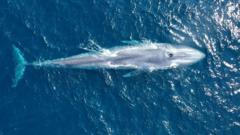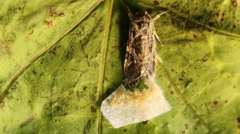Citizen-led initiatives in Timor-Leste showcase the intersection of local knowledge and technology in marine conservation, fostering community involvement and addressing ecological challenges.
**Citizen Scientists Illuminate the Lives of Pygmy Blue Whales in Timor-Leste**

**Citizen Scientists Illuminate the Lives of Pygmy Blue Whales in Timor-Leste**
Through innovative local efforts, citizen scientists are uncovering crucial insights about pygmy blue whales, contributing significantly to marine research in Timor-Leste.
As fishermen Faustino Mauloko da Cunha and his son Zacarias embark on their annual whale-spotting journeys, they are part of a groundbreaking citizen science project that studies pygmy blue whales in the South Pacific Ocean. Each year, from October to November, this dedicated duo, alongside Australian marine ecologist Karen Edyvane and other local volunteers from the village of Subaun, meticulously comb the waters, photographing and documenting the whales’ behaviors through drone technology.
Over the last decade, the citizen scientists have reported nearly 3,000 sightings, underscoring Timor-Leste’s rich marine biodiversity, particularly along its migratory route. Prof. Edyvane, who spearheaded the initiative in 2014, emphasized the project's unique contributions, revealing intimate reproductive behaviors of the species through rare footage, such as a mother caring for her calf.
The project’s inception can be traced back to a Facebook group that encouraged local community engagement. Citizens not only observe and report but have also been trained in surveying techniques and drone operations, allowing for a collaborative approach to gather real-time data. The establishment of a simple research station outside the da Cunha home has further streamlined their efforts, enabling prolonged observation of the whales' patterns.
Engagement with technology and social media has fostered excitement among locals and increased community cohesion in conservation efforts. As demand for whale-watching tours surges—now yearning amongst eco-friendly tourists and divers—the project's implications for sustainable tourism are stark. Local experts, like diving instructor Cassio Schumacher, note that whale-watching tours are booked up to two years in advance, presenting a lucrative opportunity for the community while raising awareness around marine life protection.
However, this surge in tourism has prompted non-profits to highlight the potential risks associated with unregulated activities affecting the whales and their habitat. The Timorese government aims to harness the research findings to establish protection measures for marine life, with hopes that regulated tourism can bolster the local economy.
With an average annual income of merely $600 to $900, the villagers have begun to adapt, turning their homes into meal stops for guests. Faustino and Zacarias are also adapting their roles; the former is preparing local cuisines while the latter has been trained in drone services and public speaking, ensuring their community continues to prioritize conservation education.
This grassroots initiative illustrates that with the right tools and community involvement, scientific exploration and environmental conservation can flourish, providing a model for other nations with rich marine biodiversity.
Over the last decade, the citizen scientists have reported nearly 3,000 sightings, underscoring Timor-Leste’s rich marine biodiversity, particularly along its migratory route. Prof. Edyvane, who spearheaded the initiative in 2014, emphasized the project's unique contributions, revealing intimate reproductive behaviors of the species through rare footage, such as a mother caring for her calf.
The project’s inception can be traced back to a Facebook group that encouraged local community engagement. Citizens not only observe and report but have also been trained in surveying techniques and drone operations, allowing for a collaborative approach to gather real-time data. The establishment of a simple research station outside the da Cunha home has further streamlined their efforts, enabling prolonged observation of the whales' patterns.
Engagement with technology and social media has fostered excitement among locals and increased community cohesion in conservation efforts. As demand for whale-watching tours surges—now yearning amongst eco-friendly tourists and divers—the project's implications for sustainable tourism are stark. Local experts, like diving instructor Cassio Schumacher, note that whale-watching tours are booked up to two years in advance, presenting a lucrative opportunity for the community while raising awareness around marine life protection.
However, this surge in tourism has prompted non-profits to highlight the potential risks associated with unregulated activities affecting the whales and their habitat. The Timorese government aims to harness the research findings to establish protection measures for marine life, with hopes that regulated tourism can bolster the local economy.
With an average annual income of merely $600 to $900, the villagers have begun to adapt, turning their homes into meal stops for guests. Faustino and Zacarias are also adapting their roles; the former is preparing local cuisines while the latter has been trained in drone services and public speaking, ensuring their community continues to prioritize conservation education.
This grassroots initiative illustrates that with the right tools and community involvement, scientific exploration and environmental conservation can flourish, providing a model for other nations with rich marine biodiversity.























